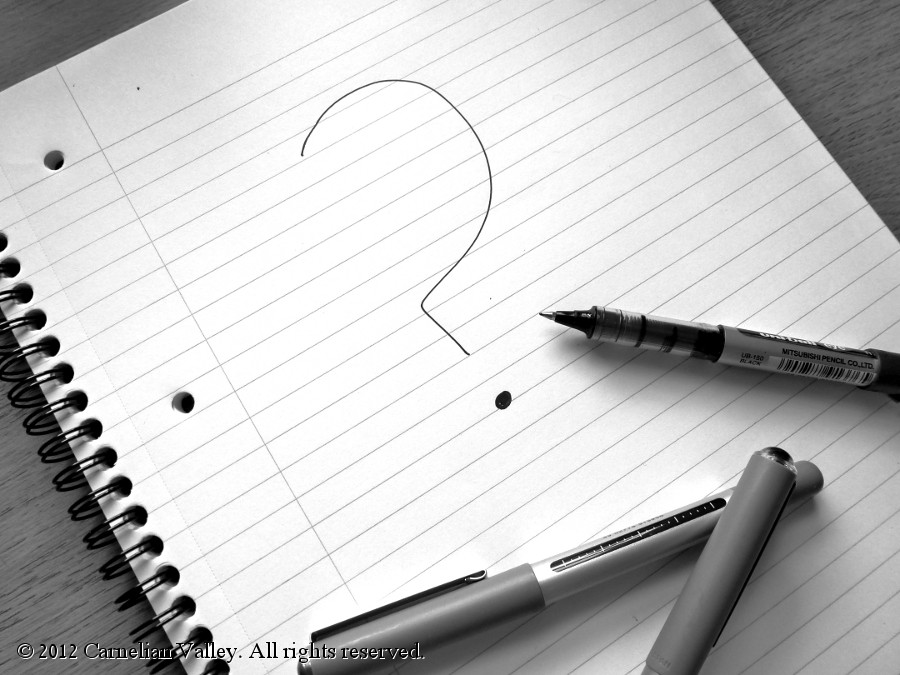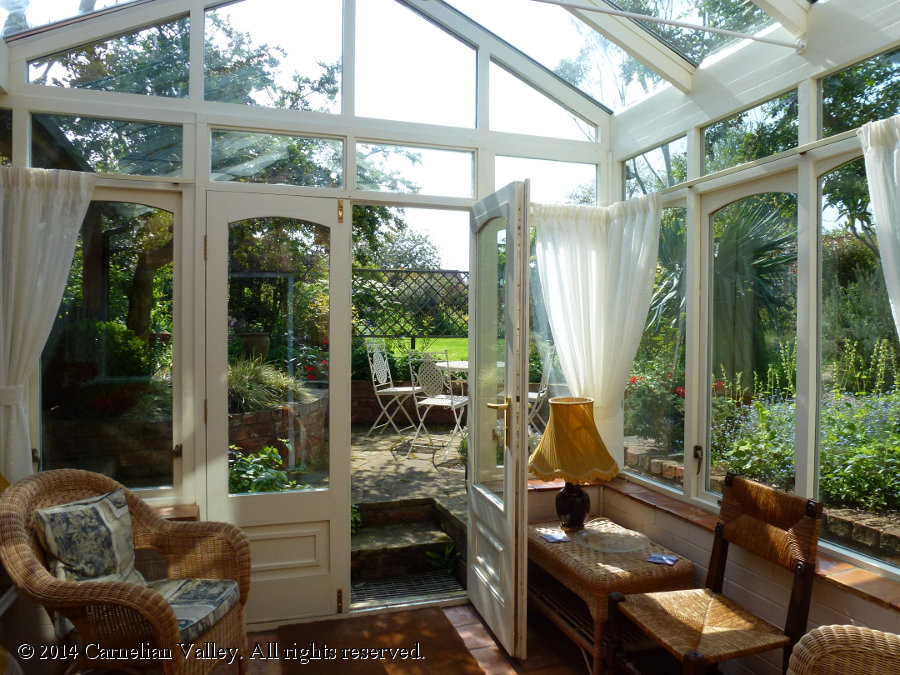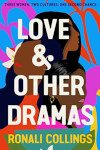On Reading For Interviews Versus Reading For Reviews
Posted 20th July 2020
Category: Chit-Chat Genres: N/A
1 Comment

Something I didn’t expect or, rather, didn’t know to expect, is that reading a book primarily with an eye to interviewing would be so at odds with reading for review and/or study, or indeed enjoyment. Granted, if I read purely for enjoyment – in other words I’m not taking many or any notes – it can be hard to write a thorough review later, but it can definitely still be done. Likewise reading for study purposes – it’s sufficiently similar.
Reading for interview is very different; perhaps not for everyone but I certainly find that regardless of the long list of questions and topics I have compiled ready for a podcast, it can be incredibly hard to continue on to a review. All talking points are there, and in theory those talking points should be able to inform a review but they become very literal – talking points, not review points.
I thought it would be as ‘easy’ as remembering that I’m reading for both interview and review (when I plan to review as well) but it’s not. This has made me aware that the two are in fact pretty different types of reading and that to combine them is a lot of work. It’s actually a bit like walking into a strong wind – not impossible but still hard.
I find in the two types different variations of close reading. I’ve wondered whether a book requires two reads for the two purposes – certainly that would make it easier to keep track. You could say they require different skills. It’s the reason there haven’t been many reviews here lately. It underlines the need to write the review soon after finishing the book; when working on a podcast the book’s ‘review’ details fade far fastest than they would normally, which makes sense given focuses.
It’s something I want to figure out a best practice for so I’ll be thinking about it in future.
Have you any experience in reading the same book(s) for different purposes?
Interests, Time, Frustration, Balance + Podcast
Posted 10th February 2020
Category: Chit-Chat Genres: N/A
1 Comment
On today’s podcast I’m joined by Andrew Blackman, author of On the Holloway Road and A Virtual Love. Andrew’s also a fellow book blogger. We discuss life on the road, following in Jack Kerouac’s footsteps, offline and online identity, climate change activism, and withholding – for very good reason – the endings your readers expect.
Email and RSS subscribers: you’ll need to open this post in your browser to see the media player below.
The main episode page, which includes the full episode details, the transcript, and a question index, is here. The podcast is also available on iTunes, Spotify, Stitcher, and now Google Podcasts as well. (Those apps may take a few hours to receive the episode.) You can also subscribe via RSS.

Something I struggle with, and I had a particularly difficult time of it Saturday evening which is why the concept came to mind, is the way that I feel like I’m not using my free time well if I’m not reading or doing a bookish thing. It may well be a me-only thing; it may be something where the activity that feels important changes based on the person at hand; it might be because I’m a recovering perfectionist; it’s probably because I’ve made books such a big part of my life, that it transcends ‘hobby’, much as it does others who’ve chosen to blog about them. It’s a self-created pressure.
If I’m only reading, however – in other words doing the exact thing I feel I should be doing – I then feel I need more variety in my life. When I’ve read a lot – say most or all of every evening for a week – and I’m not experiencing burnout, I often still have a need, almost, to watch a film or play a video game, and in turn doing those things will feel like I’m having a break.
Yep, it’s a self-created pressure of a recovering perfectionist… But I do know I’m not unique in feeling this sort of way.
It’s likely down to the question of attention span, again. Sometimes – most often when I feel this way – I wish life were more like it was before screens, of all kinds, came on the scene. I think of women gathered together in parlours and men in clubs, visiting cards and so on, and wonder how having less to choose from would have felt. My guess is it would have been less demanding, but without any experience, that’s looking with rose-tinted glasses. Less to choose from probably made what you could choose from feel less… wasteful. No Fear of Missing Out – or less of it. But then of course we know women didn’t have as many options and if we know anything, it’s that sewing all day when it wasn’t your thing got boring quickly.
There’s no conclusion here; I’m still sorting out the best way to feel less unproductive and then less wasteful for differing reasons. Certainly it’s easier to relax into hobbies when on holiday, particularly when Internet signals are weaker. An idea of a schedule works – compartmentalising my days – but it’s something that needs more work and inevitably there are times I cheat a bit.
Do you ever feel like this? How do you deal with it?
In Which Jane Austen Reviews A Book And Makes Me Laugh
Posted 5th February 2020
Category: Chit-Chat, Further Thoughts Genres: N/A
Comments Off on In Which Jane Austen Reviews A Book And Makes Me Laugh

As I’ve mentioned previously, I’m currently doing some research for a post about Jane Austen. It’s taking a lot longer than I’d thought it would so I’ll share a brief part of what I’ve noted and add to it.
On Sunday 25th November 1798, Jane wrote from Steventon to her sister Cassandra about a variety of things that were happening. Her letters to Cassandra are often lengthy, and at present I have a hunch (from the bit of research completed so far) that she is more open about her opinions of books to her sister than to anyone else; this is to be expected – as we know, they were very close.
On this day, Jane included a fair paragraph of fun background context and opinion of a book that had been published earlier that year; I’ve not been able to trace the month, but it was Arthur Fitz-Albini by Samuel Egerton Brydges, a novelist/bibliographer. Here is Jane’s opinion:
“We have got ‘Fitz-Albini’; my father has bought it against my private wishes, for it does not satisfy my feelings that we should purchase the only one of Egerton’s works of which his family are ashamed. That these scruples, however, do not at all interfere with my reading of it, you will easily believe. We have neither of us yet finished the first volume. My father is disappointed – I am not, for I expected nothing better. Never did any book carry more internal evidence of its author. Every sentiment is completely Egerton’s. There is very little story, and what there is told in a strange, uncorrected way. There are many characters introduced, apparently merely to be delineated. We have not been able to recognise any of them hitherto, except Dr. and Mrs. Hey and Mr. Oxenden, who is not very tenderly treated.” (Jane Austen in Le Faye (ed.) (2011), pp. 22-23)
Had they been a thing, I think she may have given it one star.
I’ve made a cursory search for contemporary reviews of this long-forgotten book, but it’s been difficult to find any. What I did find was an obituary for Brydges, written by John Bowyer Nichols and published in The Gentleman’s Magazine, November 1837. I’ve redacted it down to the most poignant sections on the man himself as well as the novel because as you might expect, it’s Dickensian in length:
“The biography of this gifted and laborious litterateur, this imaginative poet, and in one sense we may accurately say, this imaginary character, can scarcely be treated in the sober detail of our ordinary narrative; yet, as our object in this place is always the relation of facts, we shall, in the first instance at least, state the circumstances of his birth and early life as we should do those of any other distinguished individual, premising that the particulars are derived from his own account …
The hopes and disappointments of his early years are disclosed in his Novel, called Arthur Fitz-Albini, in which he clothed a fictitious personage with his own sentiments and aspirations, and at the same time depicted with the utmost freedom the foibles not only of his neighbours and acquaintances, but even those of his own family and relations. In Arthur Fitz-Albini, “the few, whose penetration and freedom from envy enabled them to appreciate such a character, beheld the eloquence of the enlightened senator, with the independence of the country-gentleman, and the spirit and hospitality of the feudal chief, without his fierceness, his tyranny, or his uncultivated mind. Before such a man, all the paths of glory seemed to open, and the ascent to fame appeared to be covered with flowers.
[…]
In these and many similar passages may be traced the adumbrations of Sir Egerton’s own character, and proofs that he was not unconscious of the defects which repelled the affections of his fellow-creatures, though unhappily destitute of that sober discretion and that Christian humility which would have proved the only efficient means to control or correct them.” (pp.534-539)
It’s likely that, with this obituary, and references to Brydges’ own forays into writing for the magazine, there is at least one review of the book out there, likely favourable.
Later notes about the book can be found in various biographies. A Biographical Dictionary of the Living Authors of Great Britain and Ireland (1816) notes on page 43:
“Sir S. E. B. has distinguished himself in almost every sort of polite literature, but more particularly as a critic of English poesy, in which character it is not too much to say that he stands unrivalled by any living author.”
Next, a rather lengthy biography, which is titled an autobiography, likely due to John Gibson Lockhart’s over-use of Brydges’ own words (an amount that would cause a superb number of cautions for anyone using another’s material today) was published in the Quarterly Review, no. 51, in 1834. It does cite positive points, but the majority leans towards the negative in a way that rather supports Austen’s own view:
“The other great grievance is Sir Egerton’s literary one. With respect to it, we cannot do better than re-quote an emphatic sentence from Mr. Sharp’s “Letters:” namely, “A want of harmony between the talents and the temperament is, wherever it is found, the fruitful source of faults and of sufferings. Perhaps few are less happy than those who are ambitious without industry who pant for the prize, but will not run the race.” Sir Egerton has all his days been busy without industry — perpetually panting for the prize, but never sufficiently persevering to make out one real heat.”
Over all, biographies and other writings published later than the book was published speak moderately to highly of Egerton, who was an MP who, it seems, tried to style himself as the then-head of a baronetcy he was not entitled to. Nevertheless, whatever the objective truth to the novel may be (I must say I don’t plan to read it) Austen’s effective review is definitely, if snarky, the most entertaining there is. Unfortunately, perhaps, for Brydges, it’s also likely the one that will last the longest when it comes to literary studies.
References
Books
A Biographical Dictionary of the Living Authors of Great Britain and Ireland (1816) Henry Colburn, London
Courtier, Peter L (1806) The Lyre Of Love: Volume 2, John Sharpe, London
Le Faye, Deirdre (ed.) (2011) Jane Austen’s Letters, 4th edition, Oxford University Press
Articles
Gibson Lockhart, John (1834) Autobiography of Sir Egerton Brydges, Quarterly Review, no. 51, pp.342-365
Nichols, John Bowyer (1837) Obituary: Sir Samuel Egerton Brydges, The Gentleman’s Magazine, New Series, Vol 2, pp.534-539
How Much Does It Help To Have A Reading Plan?
Posted 29th January 2020
Category: Chit-Chat Genres: N/A
3 Comments

I’m currently looking at a good month of reading, in fact I only say ‘currently’ because I’m hoping to improve it in these last few days of January. The goal I set at the start of the month has really helped; I suppose when it comes down to it, it’s effectively a to-do list and being more specific (yet general, ironically) has been key.
So this month I’ve had a reading road map, as it were, for what I was to read and for where I wanted to be at the end of the month. The idea of where you want to be is somewhat repetitive if you’ve a list of books anyway – you want to read those books, ergo you’ll have finished them – but having a starting book and, particularly, an ending book has worked wonders. It’s pushed me to carry on.
I’m well aware I could be heading for burnout. (If only burnout could be scheduled and managed!) Reading a lot in a set period of time tends to mean a period of burnout afterwards, and I would be all the less surprised this time since I had a fairly strict order for my reading. At the same time, I’m currently on a high. Perhaps burnout could be scheduled for March?
My road map was as I’ve previously stated – books for the podcast, early review copies, and carry overs from last year. I also read a couple of books I would’ve read in December had the festive season not pulled me into bonkers games like pretending to be a dinosaur at the intensity level of 1.
I’ve written about the concept of a reading plan before, and how whimsical reading can be great. But the more time goes on and I practise both these ‘versions’ of reading, the more I think one is not better than the other. I think I’d go so far as to say (though I could only ever have first-hand experience of my own reading) that both are best for everyone and best practice is simply definable as what is best at that given point. Sometimes you need structure in order to get it done, sometimes you really don’t, and I’d argue that the natural follow up to structure is whimsy and likewise in reverse.
Reading effectively with a plan puts paid to the worry that you might dither over the possibilities on your shelves, though this isn’t absolute; in forming your plan you probably needed to do some thinking. But, hopefully, the idea of structure aids in keeping that time to a minimum. Browsing shelves works so long as you are strict about it.
Yes, I’m also on a mission to cut back on the time I waste on the Internet.
So my answer to ‘how much does it help?’ is ‘very much – within the limits of a well-rounded reading life over all’. I’m loving my planning at the moment but I know it can’t last; but the important thing is to remember to use it when possible, and also when it makes the most sense.
Where do you fall in regards to this topic?
2020 Goals
Posted 15th January 2020
Category: Chit-Chat Genres: N/A
4 Comments

We’re in the second full week of January, I’m writing my goals, and I haven’t that many specifics. I think at this point, because I don’t want to leave it any longer, it’d be best to look at the general ideas I have and stitch them together. I achieved about half my reading goals for last year – I wanted to go back to some review copies I’d missed, which I did, and read more classics. But I didn’t get to the books I’d noted.
I know that I want and need to re-read more; this is simply a continuation of the latter months of last year. I also know that at present, I’ve a plan to finish that ever-present Thackeray and to read a good few more books, if possible, by the end of this month. I’m liking the idea of repeating that in February.
It strikes me that it might be best to concentrate on reading more in general, hesitantly moving a step further than my oft-stated ‘read as much as I comfortably can’. (Although that in itself isn’t cancelled out by trying to read more.)
I also know I want to carry on increasing my reading of classics; I didn’t manage to complete my Classics Club list – a lot did change in five years’ reading – but emphasising the idea that ‘classics’ doesn’t necessarily mean ‘old’ definitely helps. In the last year I’ve noticed an increase in the number of times I’ve picked up on references to classics in other books and articles.
On the first few evenings my Christmas decorations were up, I found myself wanting to watch Outlander series 2 (I watched the first series at that time so there’s a weird feeling of Christmas to it) and following a couple of weeks’ worth of internal debate over the ‘appropriateness’ of watching it when I hadn’t read the second book, I did so. Inevitably I have now decided that yes, I should read the second book, so that’s one more specific thing to add to my list.
So, in 2020 I will aim to:
- Read more by the month, looking at shorter periods of time rather than the longer period of a year, in the hopes that that lessens any thoughts of ‘oh but it doesn’t matter that I’ve not read much in these first two, three, five months, there’s so much of the year left’. (Because I do do that.)
- Read more classics of all kinds (and if one of them happens to be the Charlotte Mary Yonge I planned for last year, great).
- Get to that Thackeray and get it done.
- Read Dragonfly In Amber
Yes, that’ll do.
Do you have any reading goals for 2020? And if you read by year, so to speak, do you ever feel complacent in the first months?






















